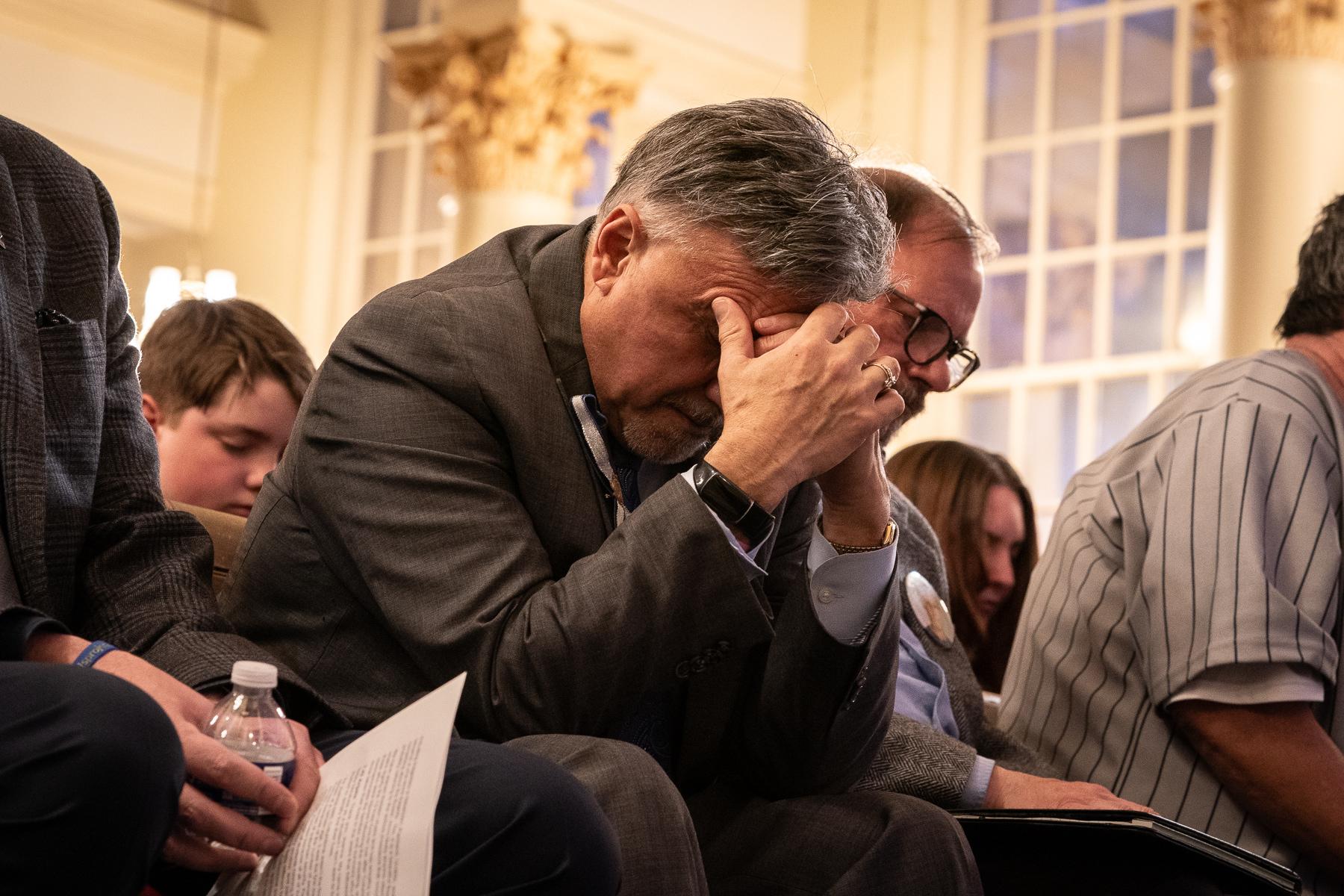
Colorado lawmakers have said for years that the state's budget is nearing a crisis point. Now, the howls of pain are so loud they've prompted an unusual bipartisan response: Lawmakers are now considering two major financial proposals.
If either of the bills, or a compromise, passes, it could fundamentally change Colorado's transportation, education and medical care.
Democratic House Speaker Crisanta Duran and Republican Senate President Kevin Grantham are co-sponsoring a plan to ask voters for a 0.62 percent increase in the state sales tax for transportation. Their deputies are teaming up on a bill to make an important accounting change in the existing budget. Both sides say there's room for negotiations which could, for instance, reduce the sales tax increase.
Republican State Sen. Jerry Sonnenberg of Sterling, in northeastern Colorado, is sponsoring the accounting change. He spoke with Colorado Matters host Ryan Warner.
Read the Transcript:
Senator Jerry Sonnenberg: It’s my pleasure to join you, Ryan. RW: A fundamental question to start: why are we seeing such big proposals from both sides of the aisle aimed right at the heart of the state’s finances now? JS: There are huge issues that we have to face in Colorado and from my perspective, even tougher issues in rural Colorado. So I think with the new administration in Washington D.C., the aspects of what we may see down the road, we need to deal with those issues now. RW: What do you mean when you say “those issues” and specifically for rural Colorado, which you represent? JS: There’s a number of issues, but there’s three major ones that my bill deals with. It deals with education funding; it deals with highway funding; and, it deals with healthcare. Education: there is an aspect in the bill that directs money to rural and small rural schools, and many of your listeners will ask, “Well, why would we just do it to those schools?” I can tell you it’s tougher for those small rural schools to adapt to changes or cuts in education financing. You can take a large school district like JeffCo or Cherry Creek, and when you make changes, you make changes in millions of dollars, and yes, you figure out ways to work through that. You make changes in small rural schools that may be $50,000-60,000 is all and that’s one teacher, but that one teacher taught two grades. RW: Well as all things in Colorado eventually do, this proposal gets us to the constitutional amendment called the Taxpayer Bill of Rights, which limits growth in government each year to the combination of population growth plus inflation and then any amount over that is refunded to taxpayers. That said, I want to look at this accounting change at the heart of your bill. It moves the Hospital Provider Fee, which hospitals pay to help fund medical care for poor people. The money collected from that fee is currently counted toward a cap in TABOR and it means that as fees collections have grown, the state has to start refunding a part of its discretionary budget back to taxpayers instead of spending it on schools or other things. What does your bill do to this often talked about and somewhat mysterious Hospital Provider Fee? JS: Essentially what it does is it creates the Hospital Provider Fee into a new enterprise outside of the state budget and then in order to follow the constitution, what makes this different than previous attempts, why Republicans have been opposed in the past, is we lower the TABOR cap to adjust for what we have taken out and put in the enterprise. RW: It sounds like a tradeoff. In other words, you will agree to do what Democrats have sought to do for a long time, which is reclassify this fee, but only if there’s this kind of reset. Am I right about that? JS: Yeah. Only if we follow our constitution, which there’s a spot in TABOR that says that if you create an enterprise – and we have used it before with Parks & Wildlife and decreased that cap to meet that constitution requirement, and we’re doing the same thing here. The challenge is going to be the numbers to pass the bill. RW: The House sponsor of your bill is that chamber’s second ranking Democrat; it’s House Majority Leader KC Becker of Boulder. She told us she generally favors this, the accounting change, but doesn’t much like lowering the TABOR cap. She thinks once the bill gets into the process, that part can be negotiated. Representative KC Becker: I don’t want to see the TABOR cap decreased. I don’t think that’s the right move for Colorado. I think we can find something that both sides of the aisle, both the House and the Senate can support. RW: Senator, is that open for negotiation or is it, in your mind, just a question of how much the cap is lowered? JS: Yes, there’s going to have to be negotiations. Now we have to figure out what that fine line is. If Representative Becker and the House moves that limit too much, I lose the support I have in the Senate. So we’re going to have to figure out what that compromise is. Obviously, it would be a much different compromise if both chambers were controlled by one party or the other, but with the split chambers, we are going to have to figure out what that compromise looks like to benefit rural Colorado and quite frankly, all of Colorado. RW: You’re listening to Colorado Matters. I’m Ryan Warner and the President Pro Tem of the state senate, Jerry Sonnenberg of Sterling, is with me. We’re talking about his proposal that would add dollars in the budget for transportation, education and potentially healthcare as well. We can’t talk about this without mentioning the other big legislative proposal this year, an increase in the statewide sales tax from 2.9% to 3.52% to pay for roads and other forms of transportation. It is sponsored by Democratic House Speaker Crisanta Duran and your boss, Republican Senate President Kevin Grantham. Let me say that the legislature can’t raise this tax itself; voters have to approve that. So they’re essentially sponsoring a bill to ask that question of Coloradans, “Would you raise the statewide sales tax to pay for transportation?” Where do you stand on that proposal? JS: Well, it’s a long ways, actually, it just got sent to the Senate past the House. I won’t have an opportunity to look at that until it’s gone through committee and they have made changes to it. I understand there will be changes. So I’m not going to commit one way or another. I can tell you in my bill, I also have a transportation aspect of that as well where we take $100 million and we bond for $1.35 billion for transportation. It’s not as much as the sales tax is putting forward, but if my bill passes, then maybe his –then Mr. President’s bill doesn’t need to have such an increase on sales tax. Mine does it within the existing structure by bonding. RW: So you are absolutely thinking of this in an ecosystem. That is, your bill related to the Hospital Provider Fee could work in concert with this proposed sales tax increase. As you say, your bill raises about $1.35 billion for bonding. The Colorado Department of Transportation has nine billion dollars on its list of road projects – just for some scale there. Because Majority Leader Becker said all of this was open for negotiation, we asked whether if Republicans were willing to negotiate on the accounting change for the Hospital Provider Fee. Democrats might consider, indeed as you say, reducing the size of their proposed tax increase. Here’s what she said about that. KB: I believe that something the Speaker and the Senate President are absolutely willing to look at, that if this bill passes with significant transportation funding in it, they might consider lowering the proposed tax that would go to voters in November. So right now, that proposed tax is .62; it could be something less. RW: I want to say that your bill, Senator, also asks that state departments propose 2% cuts to each of their budgets. Is that counterproductive, given the position the state’s in? JS: I would say not, absolutely not. The truth is we have continued to see bloated budgets through audits. I don’t see any reason whatsoever that we can’t reduce the size of government by 2% and become more efficient. I mean, that’s the whole idea of my bill as well is try to be more efficient. Matter of fact, I have entitlement reform, Medicaid reform within that bill as well. If we’re going to do the Hospital Provider Fee, let’s find more efficient ways to deliver that healthcare. That’s all part of the entire efficiency of government that I think is important and I don’t think there’s any question that government agencies can cut 2% from their budget and find a little bit of fat. RW: When you talk about Medicaid, would this potentially reduce the size of the Medicaid rolls? Are there people on Medicaid you’d like not to be on the program? JS: There is that issue with regard to how we have expanded Medicaid, but the truth is that’s driven by the federal government and we don’t have much control over that. If they make changes, I look forward to working with the state then to figure out how those changes are implemented in Colorado, but when it comes right down to it, we have to find ways to provide healthcare to those most needy that actually need it, and that’s what I’m after. RW: You have a former business owner as governor. Don’t you think if there were 2% to cut from state departments, he would’ve found it? He’s all about efficiency, isn’t he? JS: That’s a good question. His agenda is probably a little bit different than mine. I’m not going to say what the governor would prioritize over what I would prioritize, but I can tell you that I know of several places that I think I can make 2% cuts in certain agencies if I were governor. RW: Name it here today for me. JS: Quite frankly, I’d start probably with the Department of Revenue. I’d go next to the Colorado Department of Public Health and Environment, and I would change the focus – rather than governing with a hammer – to try and be more business-friendly and being helpful. They have too many people, I would argue, in the enforcement side of the agencies and not enough people in the public service side to help those people that actually have questions that may be out of compliance, that may have turned in a permit wrong, and instead of hammering them with a large fine and trying to drive them out of business, have people in place to help those customers that are trying to do business in Colorado. RW: Finally Senator Sonnenberg, your bill also strongly favors rural areas in doling out money for transportation, in particular. For instance, 25% of the funds for roads would go to counties with fewer than 50,000 people. Given that the population is highly concentrated in the metro area, is that fair? JS: And I’m not sure you can use population as the sole reason for highway funding distribution. If you look at the number of lane miles, the actual miles of highway that we have throughout Colorado, I think you have to give some credence to that factor as well. Rural Colorado hosts the number one and number two industries in this state, and that’s energy and agriculture, and if we can’t get those products safely to our urban cousins, that benefits no one. RW: Of course, severance taxes from oil and gas pay in part for some of those roads, don’t they, and the commensurate traffic with oil and gas. JS: Some of those severance tax dollars, some of them actually go to the counties to be utilized for highways, used – or for their county roads or those type of things. Very little of that actually goes into state highways. They’re distributed to counties that are impacted by oil and gas production or mineral extraction to help mitigate the costs with an increase in population. Sometimes it’s the school, sometime it’s fire departments. That’s typically how severance tax dollars are distributed regarding oil and gas. RW: Senator, thank you for being with us. JS: It's always my pleasure, Ryan. |









